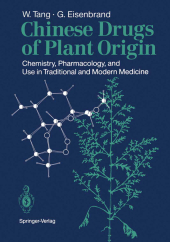 Neuerscheinungen 2011Stand: 2020-01-07 |
Schnellsuche
ISBN/Stichwort/Autor
|
Herderstraße 10
10625 Berlin
Tel.: 030 315 714 16
Fax 030 315 714 14
info@buchspektrum.de |

Gerhard Eisenbrand, Weici Tang
(Beteiligte)
Chinese Drugs of Plant Origin
Chemistry, Pharmacology, and Use in Traditional and Modern Medicine
Softcover reprint of the original 1st ed. 1992. 2011. x, 1056 S. X, 1056 pp. 41 figs. 242 mm
Verlag/Jahr: SPRINGER, BERLIN 2011
ISBN: 3-642-73741-2 (3642737412)
Neue ISBN: 978-3-642-73741-1 (9783642737411)
Preis und Lieferzeit: Bitte klicken
Traditional Chinese medicine has been used for thousands of years by a large population. It is currently still serving many of the health needs of the Chinese people; and still enjoying their confi dence it is practised in China in parallel with modern Western medical treatment. In addition to scientific organisations dedi cated to modern Western medicine, e. g. the Chinese Academy of Medical Sciences and various medical schools, a series of parallel institutions have been established in China to promote traditional Chinese medicine, such as the Academy of Traditional Chinese Medicine and training institutions. Almost all hospitals in China have a department of traditional medicine. Furthermore, a large number of scientific journals are dedicated to traditional Chinese medicine, covering both experimental and clinical investigations. Medicinal materials constitute a key topic in the treatment of disease according to traditional Chinese medicine. The Chinese Pharmacopoeia (1985 edition) is therefore divided into two sepa rate volumes, Volume I containing traditional Chinese medicinal materials and preparations and Volume II containing pharmaceu tics of Western medicine. The oldest Chinese review of medicinal materials, Shennong Bencao Jing (100-200 A. D. ), covered 365 herbal drugs. The clas sic compilation in this field, Bencao Gangmu (Compendium of Materia Medica), was published in 1578 by Li Shi-zhen and recorded as many as 1898 crude drugs of plant, animal and min eral origin.
Gerhard Eisenbrand ist der Leiter der Fachrichtung Lebensmittelchemie und Umwelttoxikologie an der Universität Kaiserlautern. Studium der Pharmazie und Lebensmittelchemie in Freiburg, Promotion. Seit 1981 Professor für Lebensmittelchemie und Umwelttoxikologie in Kaiserlautern und seit 1995 Vorsitzender der Senatskommission zur Beurteilung der gesundheitlichen Unbedenklichkeit von Lebensmitteln der Deutschen Forschungsgemeinschaft (DFG).
Gerhard Eisenbrand studied Pharmacy and Food Chemistry at the University of Freiburg, Germany and gained his PhD from the Max-Planck-Institute for Immunobiology, also in Freiburg. After a research position/ period at the German Cancer Research Center, he completed his habilitation at the University of Stuttgart, Germany, in the field of Toxicology and Food Chemistry. Since 1982 he has held a professorship for Toxicology and Food Chemistry at the Technical University of Kaiserslautern, Germany.


